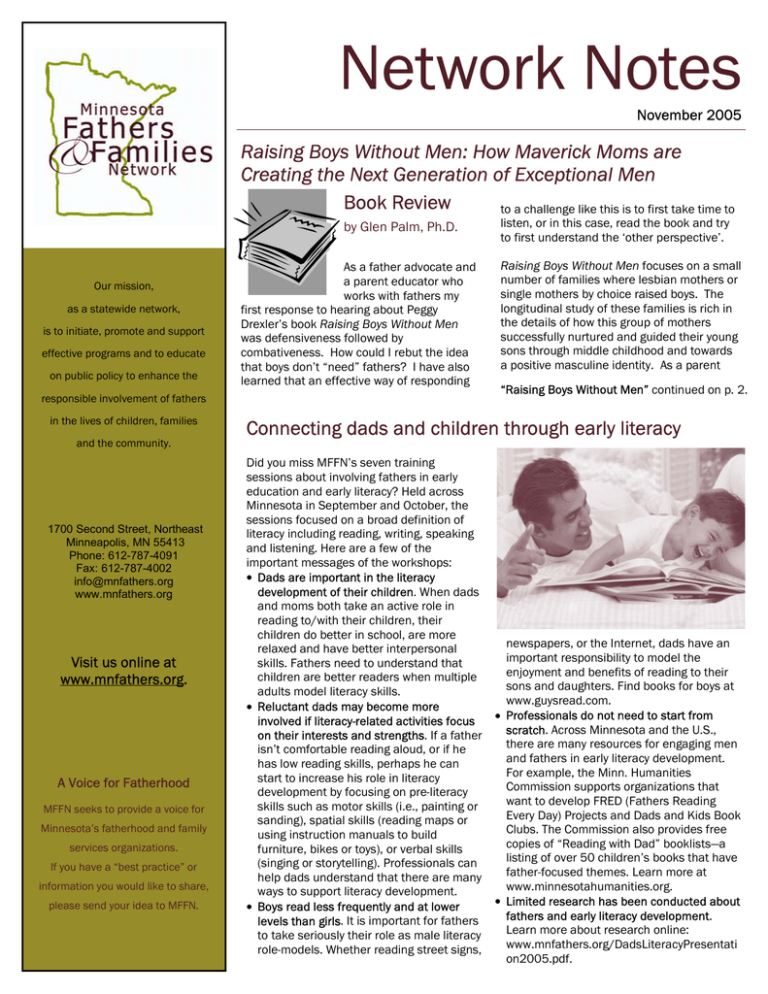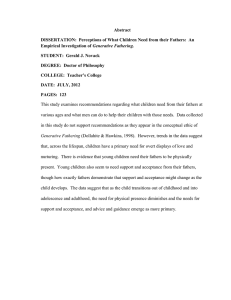November 2005
advertisement

Network Notes November 2005 Raising Boys Without Men: How Maverick Moms are Creating the Next Generation of Exceptional Men Book Review to a challenge like this is to first take time to by Glen Palm, Ph.D. Our mission, as a statewide network, is to initiate, promote and support effective programs and to educate on public policy to enhance the As a father advocate and a parent educator who works with fathers my first response to hearing about Peggy Drexler’s book Raising Boys Without Men was defensiveness followed by combativeness. How could I rebut the idea that boys don’t “need” fathers? I have also learned that an effective way of responding responsible involvement of fathers in the lives of children, families and the community. 1700 Second Street, Northeast Minneapolis, MN 55413 Phone: 612-787-4091 Fax: 612-787-4002 info@mnfathers.org www.mnfathers.org Visit us online at www.mnfathers.org. A Voice for Fatherhood MFFN seeks to provide a voice for Minnesota’s fatherhood and family services organizations. If you have a “best practice” or information you would like to share, please send your idea to MFFN. listen, or in this case, read the book and try to first understand the ‘other perspective’. Raising Boys Without Men focuses on a small number of families where lesbian mothers or single mothers by choice raised boys. The longitudinal study of these families is rich in the details of how this group of mothers successfully nurtured and guided their young sons through middle childhood and towards a positive masculine identity. As a parent “Raising Boys Without Men” continued on p. 2. Connecting dads and children through early literacy Did you miss MFFN’s seven training sessions about involving fathers in early education and early literacy? Held across Minnesota in September and October, the sessions focused on a broad definition of literacy including reading, writing, speaking and listening. Here are a few of the important messages of the workshops: • Dads are important in the literacy development of their children. When dads and moms both take an active role in reading to/with their children, their children do better in school, are more relaxed and have better interpersonal skills. Fathers need to understand that children are better readers when multiple adults model literacy skills. • Reluctant dads may become more involved if literacy-related activities focus on their interests and strengths. If a father isn’t comfortable reading aloud, or if he has low reading skills, perhaps he can start to increase his role in literacy development by focusing on pre-literacy skills such as motor skills (i.e., painting or sanding), spatial skills (reading maps or using instruction manuals to build furniture, bikes or toys), or verbal skills (singing or storytelling). Professionals can help dads understand that there are many ways to support literacy development. • Boys read less frequently and at lower levels than girls. It is important for fathers to take seriously their role as male literacy role-models. Whether reading street signs, newspapers, or the Internet, dads have an important responsibility to model the enjoyment and benefits of reading to their sons and daughters. Find books for boys at www.guysread.com. • Professionals do not need to start from scratch. Across Minnesota and the U.S., there are many resources for engaging men and fathers in early literacy development. For example, the Minn. Humanities Commission supports organizations that want to develop FRED (Fathers Reading Every Day) Projects and Dads and Kids Book Clubs. The Commission also provides free copies of “Reading with Dad” booklists—a listing of over 50 children’s books that have father-focused themes. Learn more at www.minnesotahumanities.org. • Limited research has been conducted about fathers and early literacy development. Learn more about research online: www.mnfathers.org/DadsLiteracyPresentati on2005.pdf. Network Notes—Page 2 “Raising Boys Without Men” continued from page 1. educator, I appreciated the thoughtful description and analysis of good parenting. This process is carefully summarized at the end of each chapter. In the beginning of the book, Drexler notes that maverick moms “recognize that how much time they spend—and how they interact with their kids matters much more than whether they are single, married, straight or gay.” I agree with Drexler’s basic premise that, “It is the quality of parenting, not the gender (or sexual orientation) of the parent that counts.” Drexler skillfully uses qualitative data to articulate the “essence” of good parenting based on her observations and interviews. This detailed description is an important contribution to our field. She also explores the merging gender identity of the boys. Her sub-title, “How Maverick Moms are Creating the Next Generation of Exceptional Men” tells us this is an important theme and conclusion of her research. She writes, “They developed their boyishness (i.e., masculinity) at a normal rate but their sense of justice and fairness and their ability to express their feelings were off the charts.” I value all of these qualities in men and am hopeful that more boys are adopting this model of masculinity. I also believe that “good fathering” can instill these same characteristics using some of the same “essential” parenting behaviors that Drexler describes throughout her book. I am disappointed by her need to defend motherhood and to “take a stand against the recent tide of opinion and the rash of books asserting that boys must have a father in the home in order to grow into full manhood.” She has discovered and described a positive parenting style that could be practiced by male and female parents in different family structures or contexts. She acknowledges the social and psychological capital that the mothers she studied brought to their parenting. They were educated, financially secure and they had developed a strong set of parenting skills. These characteristics probably explain more about the effectiveness of their child rearing than their gender or sexual orientation. In her rush to defend mother only families, she often portrayed the men (frequently the biological fathers) in a negative light. Many fathers possess neither the social capital nor the psychological capital described in the families that were studied and have also not developed parenting styles that are “loving and growth encouraging”. I see this as an important challenge in our society to be able to support men in developing positive parenting styles. Pitting men and women against each other in a competition for who has the best parenting style and whose presence is most important is not a productive way to encourage and support good parenting in diverse family structures. The two positive messages from this book that can inform and guide our future efforts to support parents are: (1) Social and psychological capital that provide parents with resources and support and reduce stress will strongly influence parents’ ability to display optimal parenting behaviors. (2) Parent-child relationships are nurtured by the set of parenting attitudes and behaviors described in the book, that while gender neutral are never void of gender influence. Drexler’s book reminds us that parenting is often mired in guilt feelings. Guilt is unavoidable in the complex task of making a multitude of parenting decisions that together have a profound influence on our children. Both mothers and fathers are important and both need and deserve information and support to make the best decisions for themselves and their children. While Raising Boys Without Men is meant to affirm and support mothers it does a disservice to fathers by discounting their importance. I hope that we can find ways to appreciate and support the unique, positive contributions of gender and sexual orientation to parenting and inspire the style of positive parenting that Drexler describes in her book. Details: Drexler, Peggy F. with Linden Gross. Raising Boys Without Men: How Maverick Moms Are Creating the Next Generation of Exceptional Men. Rodale. Aug. 2005. Minnesota Fatherhood & Family Services Summit Monday—Tuesday January 23—24, 2006 St. Cloud Civic Center / St. Cloud, MN Join MFFN for our 3rd annual winter conference! Whether you work with children, mothers, fathers or other family members, this Help spread the word about services for fathers! Create a web link to www.mnfathers.org. conference will have something for you. Details: www.mnfathers.org/summit.html Network Notes—Page 3 Fathers' involvement in their children's education Copyright © The National Literacy Trust 2005 One aspect of changing families in recent years is greater involvement by fathers in their children's lives. Many initiatives to promote involved fatherhood have emerged. There have also been renewed emphases in education on building strong schoolhome partnerships and on family learning. There is strong research evidence showing that parents' involvement in their children's learning has a substantial impact on children's educational attainment. In light of a gender achievement gap in schools, many experts propose the importance of positive male role models for boys' learning and reading. Much of the research published on the relationship between parents and their children's learning uses the term 'parent' but focuses almost entirely on mothers. Fathers are also absent in many family learning programs and their evaluations. • Non-resident fathers are especially unlikely to be involved in their children's school. Involvement with their children's out-ofschool learning often takes place on weekends and has a recreational focus. Schools and family learning programs have the potential to be a neutral place where non-resident fathers and their children can have positive time together. • Single-parent fathers tend to get more involved in their children's schools than do resident fathers in two-parent families. • Overall, fathers are more likely to be involved if their children's mother is involved in the child's learning and education, they had good relations with their child's mother, they or their child's mother have relatively high educational qualifications, they got involved in their child's life early on, their child is in primary school rather than secondary school, among other factors. However, the strongest association is with the level of mother's involvement. The report, “Fathers' involvement in their children's education” (April 2005), takes a comprehensive look at fathers' involvement in their school-aged children's learning and education, and in schools and family learning programs. The research was carried out in 2003 and 2004 in partnership with the Department for Education and Skills Fathers’ involvement in (London) Fathers Advisory Group of local policymakers, voluntary organizations and their children’s learning practitioners. Impact of fathers' involvement on children's learning: • There is consistent evidence that the quality and content of fathers' involvement matter more for children's outcomes than the quantity of time is associated with better fathers spend with their children. How involved are fathers in their children's learning and education - some findings: Many research studies assessing the impact educational, social, and •of fathers' involvement in their children's Extent of fathers' involvement: learning and education on children's educational emotional outcomes. • Resident fathers are less likely than outcomes are localized and small-scale and this resident mothers to be involved in many report focused on five high-quality studies with aspects of their children's out-of-school large-scale, nationally representative samples learning and in their children's school. [across the United Kingdom] of fathers and children, which • Fathers contribute substantially to specific areas of their indicate that: children's out-of-school learning: building and repairing, hobbies, • Fathers' interest in and involvement in their children's IT, math, physical play etc. There is a focus on play, leisure, learning and in schools is statistically associated with practical activities and fun. Their involvement in these areas of better educational outcomes. There are also learning is at higher rates or more frequent than mothers' associations with better social and emotional outcomes. participation. • The statistical associations with fathers' involvement are independent of mothers' involvement. • Considerable proportions of • Mothers' involvement is no substitute for fathers' fathers also read with their involvement, although there are mixed findings on any children, help with homework, differences in the strength of impact of fathers' and give praise and support to involvement and mothers' involvement. their children for their schoolwork, but at lower rates In addition, this report synthesizes the evidence about the or less frequently than do benefits of fathers' involvement for fathers and mothers, the mothers. When fathers read barriers to fathers' involvement and outlines effective practice in with their children, they often use non-fiction, environmental engaging fathers in schools and family learning programs. This print and recreational materials. report concludes with several policy implications. • Additionally, considerable proportions of resident fathers attend parents evenings and general school meetings, and drop Details: This article is a review of the report by Rebecca off and pick their children up at school, but at lower rates or less Goldman, April, 2005, “Fathers' involvement in their children's frequently than mothers. education” (London: National Family and Parenting Institute). • Much less data was found on the involvement of nonOrdering information: www.nfpi.org/data/publications/index.htm. resident fathers and single-parent fathers than on the involvement of resident fathers in two-parent families. Network Notes—Page 4 MFFN Board of Directors The Minnesota Fathers & Families Network is committed to hearing the voices of fatherhood practitioners from throughout Minnesota. Rebecca Ahlstrand, Carlton County Child Support, Carlton Jayne Anderson, Nicollet County Social Services, St. Peter Paula Baker, Bemidji Area Schools, Bemidji Jon Harper, Adventures in Fathering, Crystal R. Clarence Jones, Southside Community Health Services, Minneapolis Gar Kellom, St. John’s Univ., Collegeville Nathan Knutson, Minn. Department of Corrections, Moose Lake Nancy Norbie, Kandiyohi County Family Services, Willmar Glen Palm, St. Cloud State Univ., St. Cloud Velura Peterson, Social Services, Virginia Pat Sharbonda, Crow-Wing County Family Services Collaborative, Brainerd Jack Sharp, St. Cloud Dwaine Simms, African American Men Project, Minneapolis Enrique Soto, ConAgra Foods, St. James John Titcomb, Otter Tail - Wadena CAC Head Start, New York Mills Laura Turner, Employment / Fatherhood Advocate, St. Paul Tina Welsh, Women's Health Center, Duluth Support for MFFN is provided in part by: The McKnight Foundation, the Otto Bremer Foundation, & MFFN members. Donate to MFFN Name: Fatherhood research roundup: Recent documents examine fatherhood from a variety of perspectives "Southeast Asian Fathers' Experiences with Adolescents: Challenges and Change" This paper examines fathering experiences of Southeast Asian immigrant men who are parenting adolescent children in the U.S. Focus groups were conducted with Cambodian, Hmong, Lao, and Vietnamese immigrant fathers. The study found that most fathers wanted to become more involved in their children's lives. Read online: http://hmongstudies.org/XiongandDetznerHSJ6.pdf (Hmong Studies Journal Vol. 6, June 2005). The Child Support Program: An Investment That Works Revised to include 2004 data, this article through the Center for Law and Social Policy (CLASP) reviews how child support enforcement programs can help families achieve self-sufficiency. The article states that child support helps to connect children to their fathers and to reduce reliance on welfare, among other findings. www.clasp.org/publications/cs_funding_072605.pdf (July 2005). Returning Home: Understanding the Challenges of Prisoner Reentry Finding employment is one of the most important reintegration challenges faced by ex-offenders. The Urban Institute highlights challenges and characteristics of successful job seekers. For example, offenders’ positive perceptions of home neighborhoods correlated with higher work rates after release. Also, participation in a work-release program predicted more weeks worked after release. Online: www.urban.org/UploadedPDF/311215_employment.pdf (Aug. 2005). Fathering Magazine focuses on incarcerated men Fathering’s current issue (Vol. 3 #3) focuses on the family and community context in which men return home following incarceration. Typically men’s prison experience and return to family life are viewed either from the institutional or psychological perspective. Understanding the nature and texture of familial relationships as the former prisoner returns home is critical for understanding how he succeeds (i.e., future parole violations, arrest, and/or re-imprisonment). Online: www.mensstudies.com (Click “journals”; then click “Fathering Magazine”). ChildTrends releases new studies on family trends: Nonmarital birthrates and family dining patterns Two new studies have been released on ChildTrends’ Family Page. “Are families eating together? New research finds age, ethnicity, nativity, and poverty related to family dining.” “New trends in U.S. births and fertility rates: Teen birth rates are the lowest ever reported, but nonmarital birth rates are up significantly for women 20 and older.” Online: www.childtrendsdatabank.org/thefamily.cfm Help us to meet the needs of fatherhood advocates across Minnesota. Your gift in any amount is appreciated. Address: City, State, Zip: My gift is (please check one): Phone / Email: membership registration (basic membership is $20 annually). Amount enclosed : a gift to MFFN. an anonymous contribution. Clip and mail this form with payment to MFFN / 1700 Second St. NE / Minneapolis, MN 55413. MFFN is a 501(c)3 nonprofit organization. Your donation is tax deductible to the extent allowable by law. in memory of: in honor of: other:


